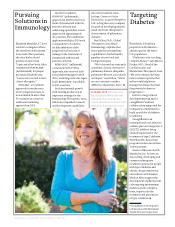Johnson and Johnson 2010 Annual Report Download - page 21
Download and view the complete annual report
Please find page 21 of the 2010 Johnson and Johnson annual report below. You can navigate through the pages in the report by either clicking on the pages listed below, or by using the keyword search tool below to find specific information within the annual report.
New
Strength
for Stroke
Treatment
About 15 million people
worldwide suffer a stroke each
year, and as many as one-third
die from it, according to the
World Health Organization.
Often, treatment or interven-
tions to prevent stroke require
physicians to use special
devices to gain access to the
brain. Two companies on
which neuro-interventional-
ists rely for such devices have
come together to create one of
the broadest portfolios and
one of the deepest pipelines in
the neurovascular industry.
In September 2010,
Johnson & Johnson acquired
Micrus Endovascular
Corporation, a global devel-
oper and manufacturer of
minimally invasive devices for
hemorrhagic (caused by
bleeding) and ischemic
(caused by a blockage) stroke.
“There are significant unmet
needs in the treatment of
neurovascular disease,” says
P. Laxmin Laxminarain,
Worldwide President, Codman
& Shurtleff. Micrus
Endovascular and Codman
Neurovascular develop
innovative and complementary
products and technologies for
treating cerebral aneurysms,
which can lead to stroke. “Our
hope is that by bringing these
companies together,” says
Laxminarain, “we can fuel
rapid and meaningful
innovation that further
improves therapeutic options
and access to care, and
ultimately makes a difference
in the treatment of this
debilitating condition.”
Unlocking the Dimensions
of the Human Heart
Thomas Buehler, 57, of Round
Lake, Ill., is hopeful he has
kicked atrial fibrillation (AFib)
for life. He hasn’t had a recur-
rence since his AFib ablation*
procedure more than a year ago,
and his electrophysiologist,
Andrea Natale, M.D., F.A.C.C.,
F.H.R.S., shares his optimism.
“Although we can never tell a
patient to forget about it
completely,” says Dr. Natale,
“in general when people do
well beyond one year, the
chance of a recurrence later
in life is very small.”
The most common form of
irregular heartbeat, AFib affects
more than 20 million people
worldwide and is the leading
cause of stroke among people
over age 65. A treatment called
AFib ablation passes energy
through a thin wire catheter
placed inside the heart to
disrupt specific tissue identified
as a trigger. The Carto® 3
System, the most advanced
3-D imaging technology from
Biosense Webster, Inc., helps
electrophysiologists perform
AFib ablation with a high degree
of accuracy.
“There is a very fine line
between doing the right thing
for the patient and taking a
chance of a complication,” says
Dr. Natale. “The Carto® 3
System shows you, in real
time, exactly where you are.
It allows you to create a
virtual geometry of the heart,
to do the procedure very
accurately.”
For seven years prior to
his procedure, Tom suffered
frequent AFib flare-ups
that lasted anywhere from
two to eight hours. “It was
depressing,” he says, recalling
the extreme fatigue that came
with them. Recently retired,
he loves taking long walks and
is enjoying living life again.
“All that anxiety and stress is
gone. My life has changed
completely.”
OPTIMISTIC OUTLOOK
A heart out of rhythm caused
fatigue and worry for
volunteer fireman Thomas
Buehler. Since his AFib
ablation procedure,
he says the anxiety and stress
he once felt are gone.
* Thermocool® Navigation
Catheters are approved for drug
refractory recurrent symptomatic
paroxysmal atrial fibrillation when
used with Carto® Systems
(excluding Navistar® RMT
Thermocool® Catheter).
JOHNSON & JOHNSON 2010 ANNUAL REPORT 19
























